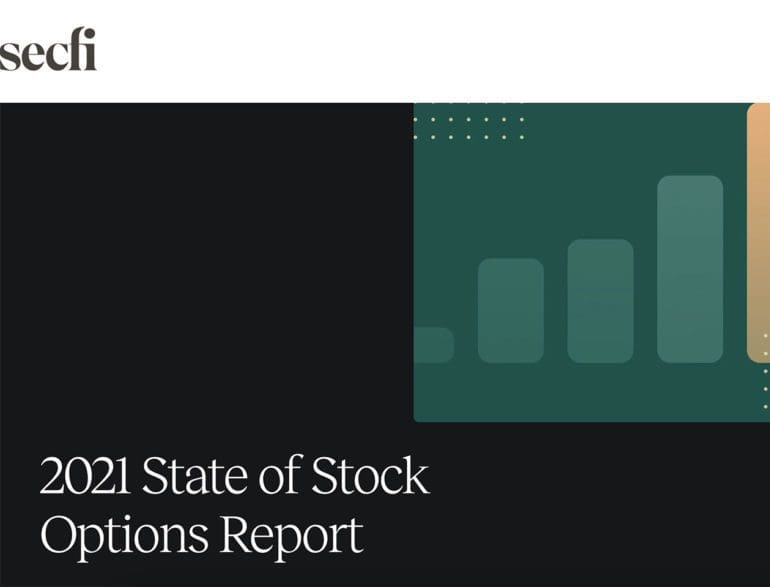White-hot fintech startup talk featuring IPOs, SPACS, and meteoric funding rounds has cooled off, and startup companies are still thriving at the halfway point of 2022.
Building B2B services for the startup ecosystem, Secfi has helped 23,000 startup employees navigate their equity and stock options.
The firm helped employees from some of 2021’s biggest IPOs, including GitLab, Coinbase, and Affirm. Recently, they doubled their team and announced the edition of Equity Education products to help more startups on Monday.
“This natural evolution of Secfi’s business advances our goal of being the startup community’s leading equity advocate,” Frederik Mijnhardt, CEO and Co-Founder, said. “Our program was developed after close collaboration with founding teams at high-growth startups who are faced with mounting questions from their employees on how to value and own their stock options, along with a desire to include equity planning to their financial wellness benefits packages.”
Secfi: A startup for startups
Founded in 2017, the San Franciscan firm has helped customers manage $25B in equity and even extended more than $500M to help employees own their stock options, the firm said. The firm said the new education tools double as recruiting tools for their partner startups: in 2022, competing for talent means more than just offering equity.

Secfi releases whitepapers on the stock options and equity world as a piece of their education efforts. According to Secfi’s 2021 state of stock options report, more than 844 US companies wnt public IPO, direct listing, or SPAC.
Mijnhardt wrote that employees in startups saw $11 billion in avoidable taxes by exercising their stock options after exit. He said it is best to exercise stock options or purchase a firm’s stock before the company goes public. Private company employees that exercised pre-IPO in 2021 saved on average $415,000 by exercising before an IPO.
Taxes can be a nightmare
The taxes on stock options are a nightmare: Secfi clients, on average, paid $396,575 in taxes on average to cash out pre-IPO.
Mijnhardt said that while 2021 was a banner year for equity earnings, there are many that missed out.
“Twenty-twenty-one saw a record number of IPOs in the U.S., generating tens of billions of dollars in wealth for startup employees. Due to the high cost to exercise, many were forced to pay unnecessary taxes by waiting until after the IPO,” Mijnhardt said. “And that only represents employees able to financially benefit: Many employees don’t enjoy the success of an IPO because they lost their options due to affordability.”
According to Secfi’s findings, while most employees want equity, they need to understand how it works to succeed. The report found that if they do, it aligns incentives, measuring 91% of startup employees feel more valued when they understand their equity.
Matthew Sullivan, VP of Finance at Unit, said in a release his firm uses Secfi.
“Competing for talent is a real challenge, especially now. Offering equity education as a resource for our employees has made it easier for our recruiters and helps them feel more valued,” Sullivan said.
Related:
By startups, for startups
The addition comes after Secfi doubled its team headcount, with notable hires David Muckley as General Counsel, Mow Kofol as Head of Biz Dev, and Uber Veteran Amrita Banerjeeas Head of Product.
“Founding teams recognize that offering equity is table stakes. The next step is to provide the resources and education so their employees can get the most out of their compensation packages,” Kofol said.” That’s where we come in: we’re a startup built by startup employees to help startup employees. We live and breathe equity, and that’s exactly what employees are asking for.”

Co-Founders Mijnhardt and Wouter Witvoet told their founding story in May last year after raising a $150m debt facility.
They told CrunchBase they were both employees at a venture-backed company when they learned the hard way how brutal stock options could play out.
“We started to leave the company, and my co-founder was hit with a 90-day exercise window,” Mijnhardt told Crunchbase. “The second hit is a massive tax bill that people don’t see coming. [Witvoet] had to sprint to find the best way, and he failed to find a solution in time.”
They looked for a Lending Club but found no such option to make their options easier to exercise. So instead, they built payout forecasting and tax modeling tools and provided “nonrecourse financing” so that employees could exercise their stock options pre-IPO without paying until the IPO launches successfully.
“Founders and executive teams need to recognize the value it adds to their company for employees to have the knowledge and ability to exercise their stock options,” Mijnhardt said. “Equity compensation itself is only the first step; that’s why many leading startups are actively providing educational resources, so employees understand their equity.”


